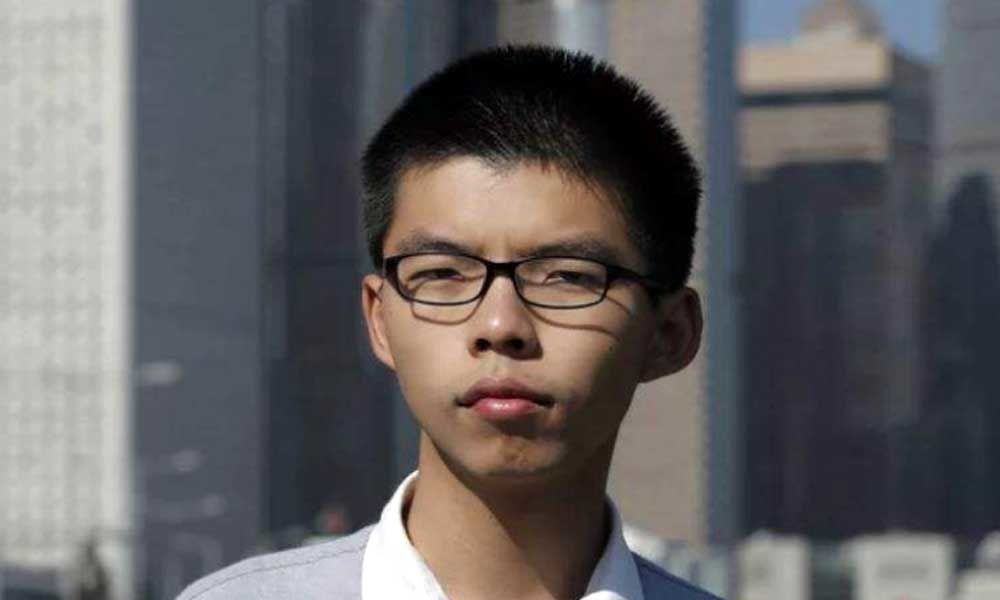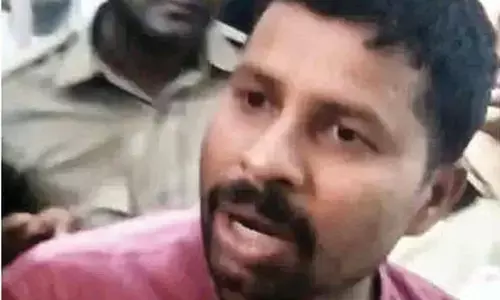Hong Kong activist Joshua Wong leaves jail, vows to join protests

Wong, the poster child of the huge pro-democracy "Umbrella Movement" protests in 2014, became the latest voice to call for Lam's resignation as he was released from a sentence.
HONGKONG: Leading Hong Kong democracy activist Joshua Wong walked free from prison on Monday and vowed to join historic anti-government protests rocking the finance hub, as activists debated how to keep pressure on the city's embattled pro-Beijing leader.
Organisers said some two million people marched in tropical heat on Sunday calling for the resignation of chief executive Carrie Lam, protesting a now abandoned bill that would have allowed extraditions to the Chinese mainland.
The city has witnessed unprecedented scenes as public anger boils towards the city's leaders and Beijing, with two record-breaking rallies a week apart punctuated by violent clashes between protesters and police armed with tear gas and rubber bullets.
Wong, the poster child of the huge pro-democracy "Umbrella Movement" protests in 2014, became the latest voice to call for Lam's resignation as he was released from a sentence imposed over his leadership of those demonstrations.
She is no longer qualified to be Hong Kong's leader," he told reporters. "I will also fight with all Hong Kongers to oppose the evil China extradition law."
Wong was sent to prison in May and was eligible for early release for good behaviour -- there is no indication the move was linked to the current protests.
Sliding tactics
Opposition to the extradition bill united an unusually wide cross-section of Hong Kong in recent weeks, from influential legal and business bodies to religious leaders.
And while the spark for the last week of protests has been the threat of extradition to China, the movement has since morphed into the latest expression of public rage against both the city's leaders and Beijing.
Many Hong Kongers believe China's leaders are stamping down on the financial hub's unique freedoms and culture.
They point to the failure of the "Umbrella Movement" to win any concessions, the imprisonment of protest leaders, the disqualification of popular lawmakers and the disappearance of Beijing-critical booksellers, among recent examples.
Critics feared the Beijing-backed extradition law would entangle people in China's notoriously opaque and politicised courts and damage the city's reputation as a safe business hub, sparking unprecedented protest turnouts.
The estimate for Sunday's massive rally has not been independently verified but if confirmed it would be the largest demonstration in Hong Kong's history.
Police, who historically give far lower estimates for political protests, said 338,000 people turned out at the demonstration's "peak", still their largest crowd estimate on record.
Tactics debate
On Monday the massive crowds from the previous night abandoned their occupation of a highway next to the parliament.
Instead smaller groups gathered in a nearby park to discuss how to keep up pressure on Lam.
"We will have to stay here till Carrie Lam changes her mind," said Candy, 32.
But others weren't sure if Lam's resignation would make a difference given Beijing's hold on the city.
"The Chinese government will just send another Carrie Lam and there will be no change," fumed Kok, a 21-year-old design student.
The extradition furore is just the latest chapter in what many see as a battle for the soul of Hong Kong.
Many Hong Kongers believe China's leaders are stamping down on the financial hub's unique freedoms and culture.
The sheer size of the last week's crowds, and unprecedented violent clashes on Wednesday, forced Lam into a major climbdown.
On Saturday she indefinitely suspended the unpopular extradition bill and she apologised a day later for the attempt causing "conflict and disputes".
But protesters have called on her to resign, shelve the bill permanently and apologise for police using tear gas and rubber bullets on Wednesday. They have also demanded all charges be dropped against anyone arrested.
In an interview with HK01 on Monday, her top advisor Bernard Chan said no chief executive would dare reintroduce the bill now.
"Everyone has forgotten what she has done. I hope people can give her another chance," he said.
Headache for Xi
The violent crowd control measures on Wednesday, used by police as protesters tried to storm the city's parliament to stop the bill being debated, have proved enormously costly for Lam's government.
Political allies and even Beijing distanced themselves from her as public anger mounted.
"I think she has lost any remaining credibility or legitimacy to rule in Hong Kong because of her own mishandling of this whole affair," lawmaker Charles Mok told RTHK Radio.
The massive rallies, which come 30 years after the Tiananmen crackdown also create a huge headache for president Xi Jinping, the most authoritarian Chinese leader since Mao Zedong.
Under the 1997 handover deal signed with Britain, China agreed to allow Hong Kong to keep unique liberties such as freedom of speech and its hugely successful independent common law courts for 50 years.
But the huge crowds this week illustrate that many of Hong Kong's 7.3 million inhabitants believe China is already reneging on that deal and fear further sliding freedoms as the city approaches that 2047 deadline.












